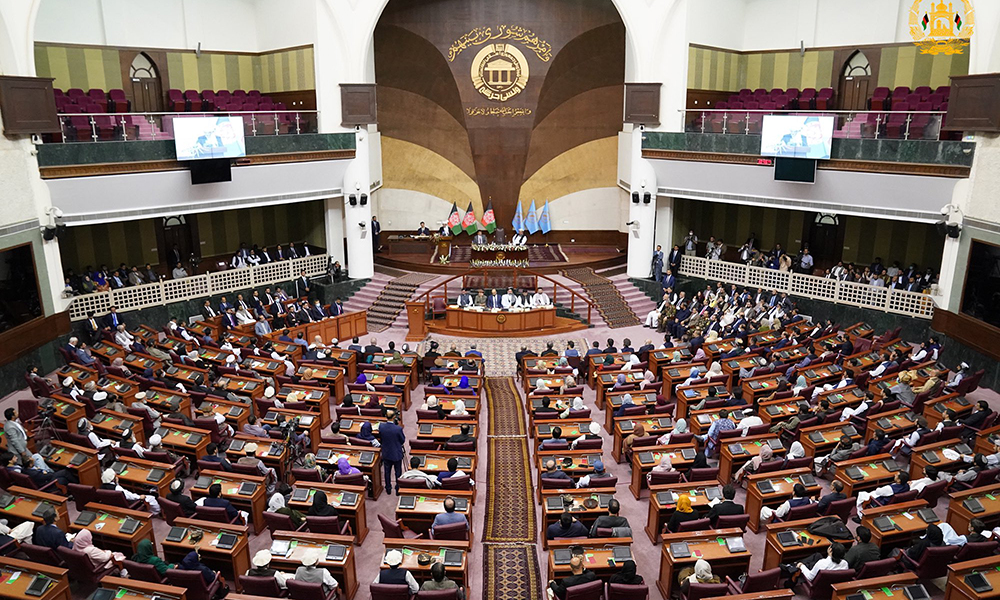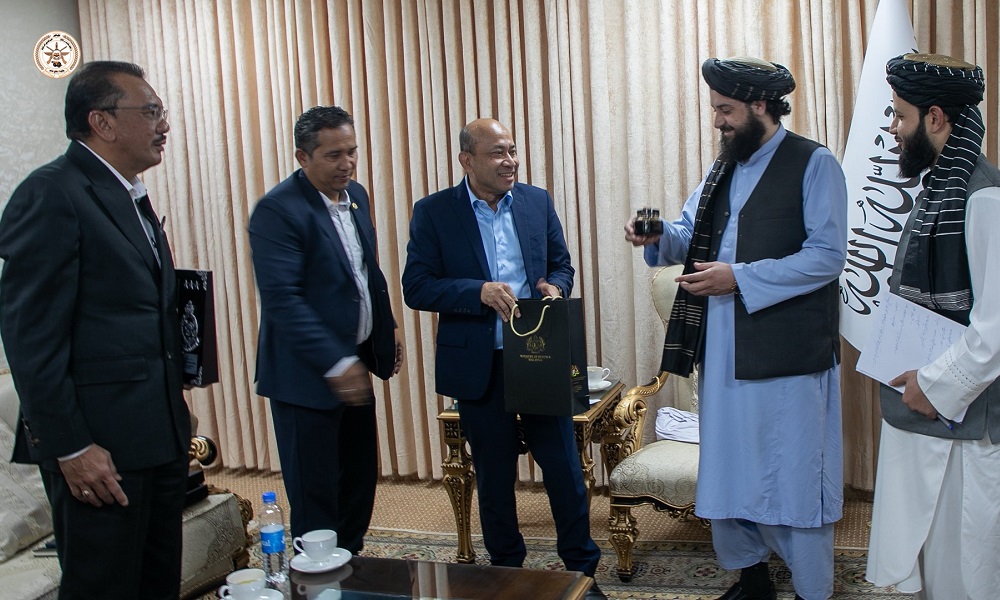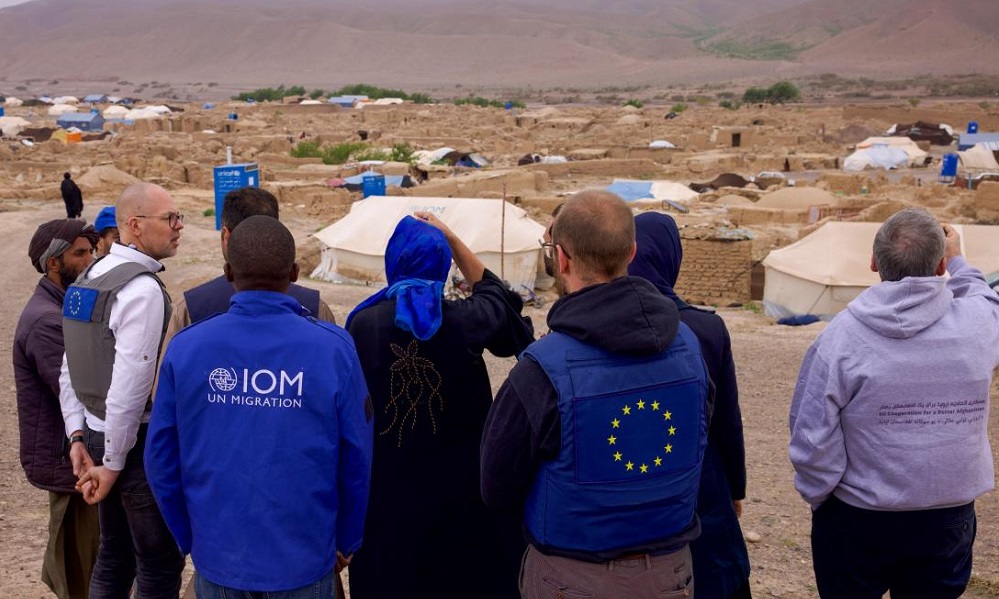Latest News
Houses of Parliament issue joint declaration in support of Republic system

The Wolesi Jirga (Lower House of Parliament) and the Meshrano Jirga (Upper House of Parliament) on Monday jointly declared their support for the country’s Republic system, the Constitution, freedom of expression, women’s rights and government’s security forces.
Their declaration came after a special session that was addressed by President Ashraf Ghani who called on all MP’s and Senators to mobilize the people to stand against the Taliban.
In their declaration, both houses stated that the achievements made over the past 20 years must not be lost and pledged to stand by the Afghan National Defense and Security Forces (ANDSF) and to work together to help resolve the crisis.
The declaration also appealed to the Taliban to join the peace process.
In addition, the two houses called on the United Nations and other international organizations to continue their financial and political support to Afghanistan and to assist in the peace process.
“We support all peace efforts,” the declaration stated.
The lawmakers also announced their firm support to the Afghan defense and security forces “who sacrifice their lives for the nation.”
“We call on the Taliban and other armed opposition groups to stop further violence and make peace,” the declaration read.
The statement implied however that the accelerated withdrawal process of foreign troops was unrealistic and had put pressure on the system.
“This process not only did not lead to peace, but also legitimized an aggressor and evil group and tried to delegitimize the united Republic. This process raised doubts. It created ambiguity and its product is the situation you see,” the declaration stated.
The declaration was issued after Ghani’s address which saw him appealing to all parliament members to come out in support of government and country.
Ghani told MPs and Senators “to use their contacts and mobilize the people” to stand against the Taliban.
He also called on MPs to unite and to reach a unanimous agreement over securing government in order for it to survive.
Ghani said at the joint session “I am with you today for a reason that we need to start a national dialogue”.
Ghani said “our priority is to achieve lasting peace, but I see sedition in the Taliban. For those who whitewash this and say that the Taliban have changed, I repeat to them that they have become more violent and more mercenary in oppression.”
Ghani said he believes the Taliban has no will for last peace but that a concise military plan has been drawn up to cover the next six months in order to suppress the Taliban.
“All preparations have been made to repel this wave of sedition for the next six months in order to restore stability. An important element of this plan, along with government forces, is the mobilization of public forces,” he said.
He also said despite the group’s promise to the US to cut ties with terrorist organizations, this has not been done.
Ghani said the Taliban has instead strengthened ties with such groups.
Ghani told MPs he would “not kneel before any destructive force. We either sit on our knees at the negotiating table or break their knees on the battlefield.”
Latest News
Tripartite trade meeting held in Kabul to boost regional connectivity

A tripartite meeting between the delegations of Afghanistan, Turkmenistan and Kazakhstan was held in Kabul with the aim of connecting North Asia to South Asia and reducing transit and transportation costs among these three countries, the Ministry of Trade and Commerce said in a statement.
In this meeting, an agreement was reached on the creation of a joint technical committee to continue the talks.
This tripartite meeting was held under the leadership of Nooruddin Azizi, the Acting Minister of Industry and Commerce, Vice President of Turkmenistan and Srik Zhumangarin, the Deputy Prime Minister of Kazakhstan.
Earlier, a bilateral meeting was held between the delegation of the Islamic Emirate and Turkmenistan. The ministry of commerce said the participants of the meeting discussed the construction of a large joint logistics center in Torghondi, the trilateral transit agreement between the IEA, Turkmenistan, and Kazakhstan, the expansion of Afghanistan’s railway, solving issues related to Afghan transit and export goods, and a number of other commercial issues.
Latest News
No destructive groups including Daesh present in Afghanistan: Yaqub Mujahid

Acting Minister of National Defense Mohammad Yaqub Mujahid has said that no destructive groups including Daesh have physical presence in Afghanistan, adding the Islamic Emirate of Afghanistan (IEA) will not allow anyone to pose threat to any country in the region from the Afghan soil.
Mujahid made the remarks in a meeting with a delegation from Malaysia in Kabul on Thursday.
According to a statement released by the Ministry of Defense, Mujahid highlighted Malaysia’s “good treatment” of Afghan refugees and its long-standing relations with Afghanistan, and said that Malaysia is a powerful Islamic country and visits should increase.
He added that with the establishment of the Islamic Emirate, occupation and war ended in Afghanistan, and the country is fully secure.
Based on the statement, the Malaysian delegation called Afghanistan a friendly country and while emphasizing on comprehensive cooperation, it assured that what they have seen in Afghanistan will be shared with the authorities of their country.
Latest News
EU allocates 17 million euros to support Afghans on the move

The European Union signed an agreement worth 17 million euros with the International Organization for Migration (IOM) to improve access to basic services, increased economic opportunities and protection for Afghans on the move and their host communities in Afghanistan.
The needs of women and girls are a particular focus of the programme, EU said in a statement released on Thursday.
The statement noted that from January 2023 until April 2024, over 1.5 million Afghans returned from Pakistan and Iran.
“I am deeply moved by the hardship returnees face when being deported to Afghanistan. In a country suffering from poverty and climate change, and in a city that just saw devastating earthquakes, this truly is a crisis within a crisis.”, said Peteris Ustubs, Director for the Middle East, Asia and Pacific of the European Commission’s Department for International Partnerships during the signing ceremony at the IOM transit centre in Herat.
Raffaella Iodice, EU Chargée d’Affaires a.i. to Afghanistan, added “The solidarity of the Afghan people towards their brothers and sisters is an inspiration. We must assure that communities hosting and helping new arrivals are supported. The partnership with IOM ensures access to essential services and provides protection for Afghan returnees and their host communities. As women and girls can be particularly affected, we make sure that all members of society can benefit”.
“IOM’s continued partnership with the EU has been critical in enabling our teams to reach hundreds of thousands of Afghan returnees and other vulnerable communities in the country”, said IOM Afghanistan Chief of Mission, Maria Moita. “Thanks to this renewed commitment, we will be able to focus on addressing the immense challenges in the areas of return and contribute to reintegration, social cohesion, and longer-term solutions for those communities.”
This additional contribution is part of a 5-year programme that is being implemented across Afghanistan and in four countries in the region. It builds on the EU’s previous support to IOM to improve the wellbeing of Afghans forced to return to the country, EU said.
-

 Latest News3 days ago
Latest News3 days agoRashid Khan named AWCC’s brand ambassador
-

 Regional4 days ago
Regional4 days agoIranian president lands in Pakistan for three-day visit to mend ties
-

 Sport4 days ago
Sport4 days agoKolkata beat Bengaluru by one run in IPL as Kohli fumes at dismissal
-

 Sport4 days ago
Sport4 days agoACL: Aino Mina 3-0 Istiqlal Kabul; Attack Energy 3-0 Khadim
-

 Climate Change4 days ago
Climate Change4 days agoRescuers race to reach those trapped by floods in China’s Guangdong
-

 Business5 days ago
Business5 days agoAfghanistan, Kazakhstan to hold joint expo in Kabul
-

 World3 days ago
World3 days agoMalaysian navy helicopters collide in mid-air, 10 killed
-

 Sport3 days ago
Sport3 days agoJaiswal ton powers Rajasthan to big IPL win
























